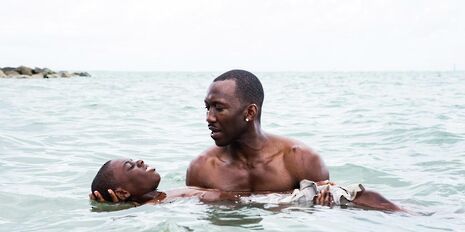Review: Three Stages of ‘Moonlight’
Richard Assheton basks in a film of grace and beauty, reflecting back at us the struggle to become ourselves…

With Moonlight’s opening scene, it is almost as if Barry Jenkins is toying with his audience: taunting us with a flash of a film he has no intention to show, a story he has no intention to tell. The wonderfully squinting, tongue-popping cool guy Mahershala Ali pulls up in his car, crosses the street and greets a drug dealer on the corner. They clasp hands. Ali lights a cigarette. A gangster flick, albeit a beautifully shot one, opens up before us. But Jenkins swerves. The camera swerves, and follows a group of boys chasing another. From that moment on all the familiar tropes are subverted, and Jenkins’s attention never wavers from the story of Chiron, the pursued.
The point of Moonlight is that it is no simple sociology of the street. It is no Wire-style story of urban degradation and racial segregation. Nor is it Ta-Nehisi Coates on screen, although it took inspiration from his visceral articulations of contemporary racism. Nor is it even a film about the African American experience like Steve McQueen’s masterpiece 12 Years a Slave.
Moonlight is so good because, with the utmost humanity and skill, Jenkins tells the universal story of the battle we each face to become ourselves, and the lengths to which the world can go to stop that happening. It is the reality but not the point of the film that Chiron is gay in the hyper-masculine African American neighbourhood of Liberty City, Miami - which was also the origin of Jenkins and Tarell Alvin McCraney, upon whose un-produced play the film is built.
“We see Chiron change dramatically, and yet there is never any doubt that behind Alex Hibbert, Ashton Sanders and Trevante Rhodes’s forlorn eyes, there is one lost soul”
This is only Jenkins’s second feature film, and like fellow young thing La La Land’s Damien Chazelle, he has announced himself as a stagger-out-of-the-cinema-good director. Inspired by one of his many foreign art-house heroes, he gives us Chiron’s story in three chapters with three actors. Coupled with his decision to not cast actors who resemble each other but ones who ‘had the same feeling’ in their eyes, this is revelatory. We see Chiron change dramatically, and yet there is never any doubt that behind Alex Hibbert, Ashton Sanders and Trevante Rhodes’s forlorn eyes, there is one lost soul.
Hibbert, Sanders and Rhodes give heart-breaking performances. Each have the same slow, uncertain smile and hanging head and arms. Rhodes is perhaps the most memorable, adding to his inner fragility a brittle outer shell of muscle and bravado that is easily shattered by André Holland as Kevin. Naomie Harris gives surely the best performance of her career as Chiron’s crack-addicted mother. She was so convincing in the role (inspired by Jenkins’s own mother) that he struggled to film her scenes.
Jenkins uses sight and sound to lift Moonlight high above the tarmac. In the kind of bold counter-intuitive tack that seems to define his filmmaking, he opts for an orchestral soundtrack by Nicholas Britell (The Big Short, 12 Years a Slave). It’s a move comparable to Stanley Kubrick’s decision to use Strauss in space with 2001: A Space Odyssey. Hip-hop only plays for Rhodes’s swagger, and even then comes with strings, chopped and screwed Miami-style. Orthodox refrains of piano and strings are layered over James Laxton’s circling, high-low, pastel cinematography create soaring moments of pure cinema. We might be watching Paolo Sorrentino at his best were it not for the pain of Chiron’s struggle.
In a recent interview Jenkins cited a phrase of Coates’s to describe the contemporary African American experience: ‘the beautiful struggle’. He has given us that, but he has given us so much more.
Aided by the most artful of technical contributions, Jenkins has shown us in vivid beauty the struggle we each face for identity and acceptance. In next week’s climactic night of Hollywood glamour, his American art-house might just give ol’ La La Land a run for its money
 News / Meta opens £12 million lab in Cambridge 11 July 2025
News / Meta opens £12 million lab in Cambridge 11 July 2025 Lifestyle / Reflections on rowing10 July 2025
Lifestyle / Reflections on rowing10 July 2025 News / Write for Varsity this Michaelmas13 July 2025
News / Write for Varsity this Michaelmas13 July 2025 Features / How to catch a coat thief13 July 2025
Features / How to catch a coat thief13 July 2025 Comment / What is originality, anyway? 14 July 2025
Comment / What is originality, anyway? 14 July 2025








